We are developing the social individualist meta-context for the future. From the very serious to the extremely frivolous... lets see what is on the mind of the Samizdata people.
Samizdata, derived from Samizdat /n. - a system of clandestine publication of banned literature in the USSR [Russ.,= self-publishing house]
|
I was switching from television station to television station when I came upon a show (on “Sky 3”) called Riverdance In China.
OK, I thought, a group of athletic Irish people dancing in China – I will see what the show is like.
And then an Irish women’s voice said something close to the following:
“The Chinese Emperors tyrannically isolated the country from the outside world, but in the first years of the 20th century the Communists under Chairman Mao overthrow the Emperors and the lives of hundreds of millions of people gradually improved…”
Perhaps it got better after this, but I do not know because I turned it off.
Well once the Emperors of China may indeed have isolated China from the outside world, but that certainly was not true in the “early years of the 20th century”, when one could, for example, buy Chinese railway bonds on all the major exchanges of the world.
The Chinese Communists did not overthrow the Emperors – the Chinese Communist Party did not even exist in 1911 when Sun Yat-Sen (and his protégé, Chiang Kai Shek) overthrew the Qing Dynasty.
And as for the life of the Chinese people gradually improving under the Communists, in reality tens of millions of them starved to death during the collectivist ‘Great Leap Forward’ and the rest of it. About 60 million people were murdered under Mao, so perhaps ‘gradually improved’ might not have been the most appropriate choice of words.
Also even the most statist Emperor never demanded that people make steel in their back yards (you can guess what this steel was like) or launched a campaign to exterminate birds in the demented hope that it would improve the harvest (surprise, surprise, there was a plague of insects).
Perhaps the show introduction was, unintentionally, amusing for people who have read books like Mao: The Untold Story, but remember – a lot of young people (and not so young people) get what knowledge of the world they have from sources like the introduction to this show, which is a great pity.
Ecogeek reports:
In the next 12 months, McDonald’s plans on creating enough fuel to power its 155 delivery vehicles while having enough fuel left over to sell into the public market. The fuel will be composed of 85% waste vegetable oil and 15% virgin rapeseed oil. So, while it will be 100% carbon neutral, it won’t be entirely waste oil.
It is all very well training executives in communication with the media. Somehow I have a feeling that if the guy was allow to talk normally instead of using the pseudo-technical press-release talk, this might have been avoided.
However, Matthew Howe, Senior VP of McDonald’s UK was quoted saying:”As we get better at the refinement we will be able to remove virgin rape from the process”, a line which we sincerely hope never gets taken out of context. [emphasis mine]
Now please excuse me whilst I clean the tea from out of my keyboard.
A marvellous article by Antony Jay in today’s Daily Telegraph confirms what has been obvious for some time to anyone reading political blogs and pundits – the BBC is biased. And not only that, it has its own ideology that Antony Jay calls ‘media liberal ideology’. His article analyses impact of technology, history and perspectives on individual and institutions that defined the BBC and with it the chattering classes. A must read as it provides a solid backbone to our rants against the BBC politics. Here are a few morsels that should give you a taste of the piece.
Of people working at the BBC and particularly on Newsnight, which he produced for several years.
…we were not just anti-Macmillan; we were anti-industry, anti-capitalism, anti-advertising, anti-selling, anti-profit, anti-patriotism, anti-monarchy, anti-Empire, anti-police, anti-armed forces, anti-bomb, anti-authority. Almost anything that made the world a freer, safer and more prosperous place, you name it, we were anti it.
I disagree with the final sentence of the following quote. There is never too much freedom or too much variety, nevertheless the distinction is brilliant. Saying that there is too much freedom is like saying that there are too many notes in Mozart’s music… which ones would you like to remove? But I digress:
…there have always been two principal ways of misunderstanding a society: by looking down on it from above, and by looking up at it from below. In other words, by identifying with institutions or by identifying with individuals.
To look down on society from above, from the point of view of the ruling groups, the institutions, is to see the dangers of the organism splitting apart, the individual components shooting off in different directions, until everything dissolves into anarchy. Those who see society in this way are preoccupied with the need for order, discipline, control, authority and organisation.
To look up at society from below, from the point of view of the lowest group, the governed, is to see the dangers of the organism growing ever more rigid and oppressive until it fossilises into a monolithic tyranny. Those who see society in this way are preoccupied with the need for liberty, equality, self-expression, representation, freedom of speech and action and worship, and the rights of the individual. The reason for the popularity of these misunderstandings is that both views are correct, as far as they go, and both sets of dangers are real but there is no “right” point of view. The most you can ever say is that sometimes society is in danger from too much authority and uniformity and sometimes from too much freedom and variety.
A brutal description of the media elite’s views and attitudes and how they got there:
The second factor which shaped our media liberal attitudes was a sense of exclusion. We saw ourselves as part of the intellectual élite, full of ideas about how the country should be run, and yet with no involvement in the process or power to do anything about it. Being naïve in the way institutions actually work, yet having good arts degrees from reputable universities, we were convinced that Britain’s problems were the result of the stupidity of the people in charge. We ignored the tedious practicalities of getting institutions to adopt and implement ideas.
This ignorance of the realities of government and management enabled us to occupy the moral high ground. We saw ourselves as clever people in a stupid world, upright people in a corrupt world, compassionate people in a brutal world, libertarian people in an authoritarian world. We were not Marxists but accepted a lot of Marxist social analysis. Some people called us arrogant; looking back, I am afraid I cannot dispute the epithet.
And here he spells out their anti-market bias:
We also had an almost complete ignorance of market economics. That ignorance is still there. Say ”Tesco” to a media liberal and the patellar reflex says, “Exploiting African farmers and driving out small shopkeepers”. The achievement of providing the range of goods, the competitive prices, the food quality, the speed of service and the ease of parking that attract millions of shoppers every day does not show up on the media liberal radar.
It’s an ideology!
For a time it puzzled me that after 50 years of tumultuous change the media liberal attitudes could remain almost identical to those I shared in the 1950s. Then it gradually dawned on me: my BBC media liberalism was not a political philosophy, even less a political programme. It was an ideology based not on observation and deduction but on faith and doctrine. We were rather weak on facts and figures, on causes and consequences, and shied away from arguments about practicalities. If defeated on one point we just retreated to another; we did not change our beliefs. We were, of course, believers in democracy. The trouble was that our understanding of it was structurally simplistic and politically naïve. It did not go much further than one-adult-one-vote.
We ignored the whole truth, namely that modern Western civilisation stands on four pillars, and elected governments is only one of them. Equally important is the rule of law. The other two are economic: the right to own private property and the right to buy and sell your property, goods, services and labour. (Freedom of speech, worship, and association derive from them; with an elected government and the rule of law a nation can choose how much it wants of each). We never got this far with our analysis. The two economic freedoms led straight to the heresy of free enterprise capitalism – and yet without them any meaningful freedom is impossible.
But analysis was irrelevant to us. Ultimately, it was not a question of whether a policy worked but whether it was right or wrong when judged by our media liberal moral standards. There was no argument about whether, say, capital punishment worked. If retentionists came up with statistics showing that abolition increased the number of murders we simply rejected them.
And the damning conclusion:
It is not so much that their ideas and arguments are harebrained and impracticable: some of their causes are in fact admirable. The trouble – you might even say the tragedy – is that their implementation by governments eager for media approval has progressively damaged our institutions. Media liberal pressure has prompted a stream of laws, regulations and directives to champion the criminal against the police, the child against the school, the patient against the hospital, the employee against the company, the soldier against the army, the borrower against the bank, the convict against the prison – there is a new case in the papers almost every day, and each victory is a small erosion of the efficiency and effectiveness of the institution.
I can now see that my old BBC media liberalism was not a basis for government. It was an ideology of opposition, valuable for restraining the excesses of institutions and campaigning against the abuses of authority but it was not a way of actually running anything. It serves a vital function when government is dictatorial and oppressive, but when government is ineffective and over-permissive it is hopelessly inappropriate.
I can’t deny that my perceptions have come through the experience of leaving the BBC. Suppose I had stayed. Would I have remained a devotee of the metropolitan media liberal ideology that I once absorbed so readily? I have an awful fear that the answer is yes.
I may not agree with everything Antony Jay says and believes but that does not detract from the value of his, well, confession. Aptly, the article is an abridged extract from ‘Confessions of a Reformed BBC Producer’ to be published tomorrow by CPS.
We can categorically state that we have not released man-eating badgers into the area
– UK military spokesman Major Mike Shearer.
 Not often you see a remark quite like that. Not often you see a remark quite like that.
(via Alec Muffet)
Yes, I know what the actual charges filed against Black were, but there is an interesting article in the Guardian by former Telegraph editorial director Kim Fletcher called The wages of envy which raises some interesting points.
It is in the nature of court cases that findings of guilt lend an artificial certainty to the world. Black will now find himself spoken of as another Robert Maxwell. But while Black’s detractors were quickly out of the traps to say “we told you so”, it became clear during the trial that nothing going on at Hollinger was in the same league as the Mirror under Maxwell. Before his trial the result had been seen even by Black’s circle as a foregone conclusion. “There’s no way a blue collar jury in Chicago can let a man who looks like Conrad off every charge,” said one of his friends to me, before the trial began
Given that the central charges failed, it does make me wonder if he was not in truth convicted of being unapologetic about being rich and being called Lord Black. Perhaps the verdict had as much to do with the jury selection process and where the prosecution chose to hold the trial than whatever Lord Black actually did or did not do.
Things were ‘mostly quieter’ for me on May 28th, the Sunday of the conference. I had my one and only chance to run about the exhibitor areas to pick up flyers, buy shirts… and acquire a few DVD’s of sessions I really wanted to see but could not due to being in demand elsewhere.
I briefly met Dr. Kistler of Rocketplane Kistler earlier but did not get a picture of him until he came by their exhibit for a photo op. I happened to be chatting with a friend who was manning their company table next to it so I joined the others. The hotel lighting in the public areas was rather problematic for my camera and few of the photos I took there were satisfactory. But hey, this is a really serious old school rocket scientist with a German accent.
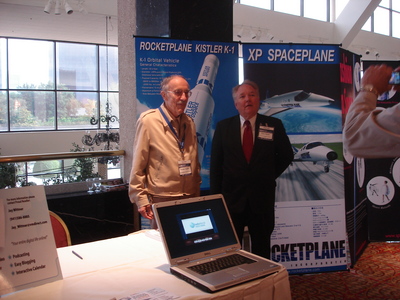
Dr. Kistler, on the left, founded Kistler Aerospace. This merged with Chuck Laur’s company, Rocketplane, to become Rocketplane-Kistler. They have a contract from NASA for space station cargo delivery.
Photo: copyright Dale Amon, All Rights Reserved
Late Sunday afternoon there was a demonstration which friends had told me about: Faster Than Light signal propagation. I am rather skeptical of such things but the demonstrator was a serious research physicist from Germany, I believe, so I had to go and see for myself.
All I can say is, I think I saw FTL comms. Nothing practical in real life as the difficulty increases with distance. This rather negates the reason you would want it in the first place. But over a distance of about 3 meters the return signal with the ‘barriers’ in returned faster than it did with the barriers out (normal light speed) as shown on an OScope synced to the outgoing pulse. He could even modulate it.
I will not go into detail here. You can look for yourself at the photos I took of his presentation. Look for photo numbers around dsc00616. I am still skeptical… but not quite as skeptical as before the demo.
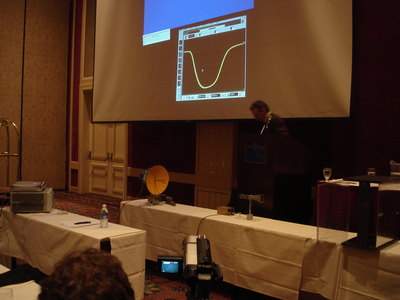
Was it or wasn’t it? Demonstration of faster than light signal propagation.
Photo: copyright Dale Amon, All Rights Reserved
Sunday night we had our closing banquet with Harrison Schmidt, the geologist who flew on Apollo 17 and one of the three Apollo guys at the conference. Actually this is not unusual as Harrison, Buzz and Rusty Schweikart are regulars and Buzz served as the Chairman of the Board through part of the nineties. Harrison has long been a promoter of human settlement and was given our O’Neill award in recognition of his efforts. Excuse the defect in the photo: I think the professional photographers flash went off just as I took this shot. She was standing right next to me.
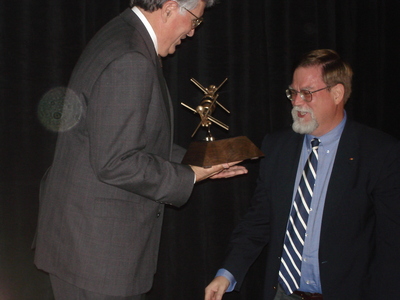
Mark Hopkins bows in unworthiness before one of the last men to set foot on the moon.
Photo: copyright Dale Amon, All Rights Reserved
At the end of the banquet George Whitesides, NSS Executive Director, presented Carol Johnson and Ken Murphy with tokens of appreciation from the Society for their hard work. As the Chairman of the NSS Conferences Coordinating Committee I was sort of their ‘boss’ so I can publicly state they were a pleasure to work with over the last two and a half years, besides the fact that they ran a magnificent conference.
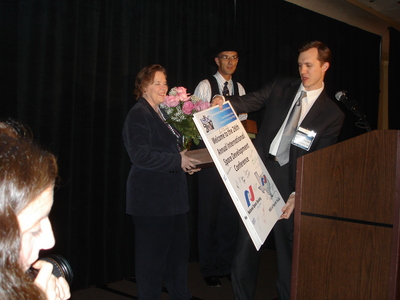
Yes, Ken really did wear a black hat. Carol got the roses since they would not have matched Ken’s je ne sais quoi…
Photo: copyright Dale Amon, All Rights Reserved
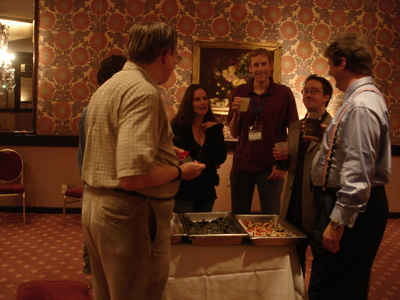
And then we partied long into the night…
Photo: copyright Dale Amon, All Rights Reserved
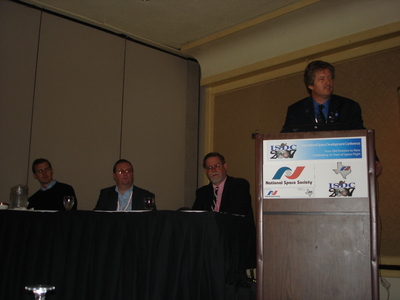
We crawled out of bed for the Society Town Hall Meeting…
Photo: copyright Dale Amon, All Rights Reserved

And then, for the 26th time, it was over…
Photo: copyright Dale Amon, All Rights Reserved
After the conference I spent a week in Dallas with an old friend. That will take us up to the beginning of June. So tomorrow: Aviation museums!
Or I hope so. I take a train to NYC tomorrow, repack, fly out to Denver and on to Laramie on space business Monday.
Via Reason magazine’s Hit & Run blog, here is this rather amusing item about how French motorists with clean driving licences sell their speeding points online for a fee to drivers who are in danger of using up all their points and then getting banned. Yes, yes, I can see the usual Dudley Do-Rights out there bleating that this is all terribly naughty, a sign of decadence, blah, but in fact what this demonstrates, in a slightly naughty French way, is how if you oppress people enough with laws and taxes over a period of time, it breeds such disregard for the law that even laws that have sense – and driving very fast can be bloody dangerous – get spurned. (It appears the French are smarter at getting around certain rules – look at what happened to former Spurs, Manchester United and England player Teddy Sheringham for allegedly trying to pull the same speeding-point move).
I have driven a few times along France’s magnificent, sweeping autoroutes, and am occasionally reminded that France invented Formula 1 motor racing. Maybe there’s plenty of life left in Gaul yet. If only they could do capitalism in a slightly more routine way.
Talking of such alternative markets, here is an old article about the market in air miles.
Conrad Black has been convicted of some of the charges that were directed against him.
Whatever the rights and wrongs of the case (my own view is that the whole case was bullshit and the jury convicted him because of envy of his ‘lavish lifestyle’) it underscores the old point that being a director of corporation is a very dangerous thing to be in the United States. Far more managers go to jail in the United States than in any other Western country (even as a percentage of the total).
Perhaps the first Henry Ford had it right. After losing some civil cases against him by minority shareholders, he bought them out – every one of them. Only if owned 100% of the company could he feel secure against someone saying he was not doing right by the shareholders.
As for the other shareholders, the campaign against Lord Black has cost them vastly more than his pay and perks ever did. Too late perhaps some of them now understand that he was the company and, without him, it was nothing.
All the above should not be held to mean that I now accept Lord Black’s opinions. For example, I still do not agree with his opinion that FDR was a moderate man or a good President. However, it is possible that Sir Conrad may now revise his opinion of the person who did more than anyone else in the 20th century to help create the vastly powerful (almost arbitrary) American government that was directed against him.
There was much of interest in the program of the ISDC, but I missed seeing most of it and much of what I did see was covered at the time by Glenn Reynolds and Rand Simberg among others. As I have noted before, I am part of the National Space Society management so I see a very different face of the conference than most attendees. Much of my time there would be terribly unexciting to write about. I very much doubt a detailed discussion of the 2009 conference site selection meetings, presentations, politics and such would be of a great deal of interest.
Today i will look at the May 26th evening of the conference via candid shots of the people and proceedings.
There is more to the space movement than rocket science. Art and music also have a place. We have had Space Art shows at every ISDC I have attended, which is all but four.
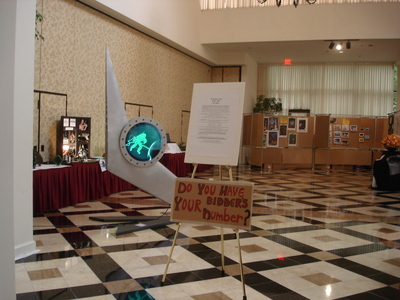
We had a fine Space Art show, thanks to Teresa Patterson and Kaz.
Photo: copyright Dale Amon, All Rights Reserved
We have had everything from John Denver (speaking only) to a Space Improv Theater group. At the one I ran years ago, we even had a ballet dance interpretation of Zero G done to a live electronic music performance. As one would expect, there are often filkers lurking about ready to spice up a party with “Home, Home on Lagrange” or “Ron, Ron, Ron, Deuteron, Ron, Ron Ron”.
I caught Rand Simberg, Glenn Reynolds and Alan Boyle chatting before the awards banquet on Saturday evening. Oh, and there was a former head of NASA Ames with us as well, just outside of the picture. I discovered he is a professional musician on the side so we hit it off quite well.
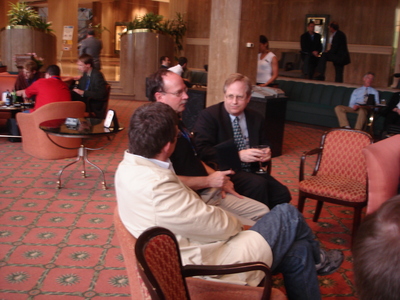
Why is it bloggers always seem to congregate in the bar?
Photo: copyright Dale Amon, All Rights Reserved
The NSS annual award banquet is a big event for our community. We have several major awards: the Heinlein Award, a working model brass cannon on a hardwood base; the O’Neill award, a space colony replica; The Space Pioneer Awards, pewter lunar globes; and finally the Von Braun Award. The Heinlein and Von Braun alternate years. Both men were intimately involved with the founding branches of our society so this is a fitting way for NSS to honour extraordinary members of the space community.
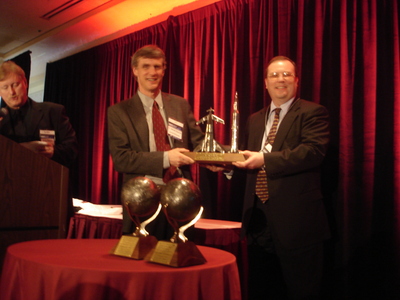
Our Chairman of the Board of Directors (an Aussie), Kirby Ikin, bestows one of our highest honours upon Dr. Steve Squires of JPL.
Photo: copyright Dale Amon, All Rights Reserved
Weeks before the event Mark Hopkins, one of our senior officers, asked if I could snap photos at the awards banquet. Even though there was a professional photographer, with equipment to die for also talking pictures in front of the podium, I did not realize I was being set up until my name was called…
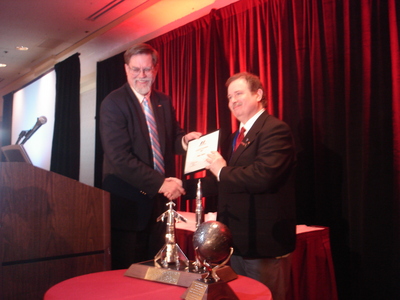
Mark Hopkins bestows the NSS Exceptional Service Award upon a very surprised me.
Photo: copyright Dale Amon, All Rights Reserved
After the banquet came the receptions and a mobile party which finally settled in, with the tolerance of the hotel, in a 15th floor meeting area. This one lasted until dawn I believe, but I had to be up for the morning sessions so I only stayed until 3am. Or so.
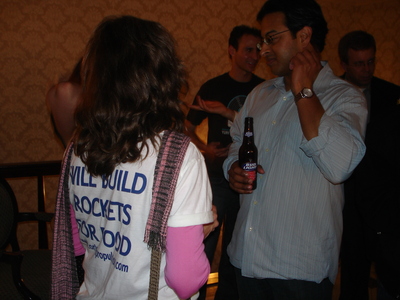
Some of our people are very dedicated to getting off the planet.
Photo: copyright Dale Amon, All Rights Reserved
Excuse the darkness but I preferred that to the loss of mood my flash causes. I loath flash shots and do them as little as I can. Perhaps someday I will own a camera that is fast enough to match my photgraphic tastes. Stabilization during long exposures would be nice…
The party was brought to us by the Students for the Exploration and Development of Space (SEDS) with a bit of assistance from our expert speaker to hotel staff.
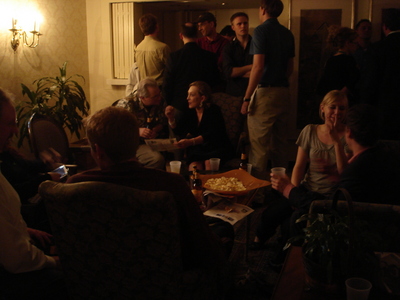
Serious partiers… check.
Photo: copyright Dale Amon, All Rights Reserved

Food… check..
Photo: copyright Dale Amon, All Rights Reserved

Alcohol… check. 6ft 4in Dallas conference chair in a white cowboy hat???… check.
Photo: copyright Dale Amon, All Rights Reserved
They never give up. An article nicely slams attempts by UK neo-Malthusians to get us all frightened about the terrible idea of people wanting to have babies. Selfish, cruel to the Planet Earth, a drain on “resources”: you know the litany. Here’s an excerpt from the article, which I recommend:
Of all the bogeys you might have thought well and truly nailed in the past decade or so, the population control movement seemed most obviously to have a stake through its heart. At a time when we – I mean, anyone over 35 – are all horribly conscious that there won’t be enough taxpayers to support us in gin and cigarettes in our old age, the very last thing we need to worry about is excess population growth. On the contrary: as seen from the dinner party circuit, the real crisis is the difficulty for female graduates in getting anyone to breed with. Forty per cent of women graduates don’t have a single baby at the age of 35.
Quite. The obsession with their being “too many” people (quite how anyone can work that out is a mystery) is something I find rather malevolent. In any event, as the writer quoted makes clear, it seems a bit weird for the population worriers to go on about supposedly high birthrates when in fact a lot of recent commentary – from the likes of Mark Steyn – has tended to suggest quite the opposite. Indeed, Steyn and others argue that the indigenous population of western Europe, or parts of it, is stagnating and birthrates have fallen below the replacement level (the level required to maintain a stable level). And of course, to enforce strict population controls, even if it makes any kind of sense (it does not) begs the question of how. Does it require China-style policies that lead to mass abortions and an imbalance between girls and boys? I ask these questions now because while watching the BBC television show this morning as I got ready for work, I saw some middle-aged, white-haired woman, a sort of genteel Rosa Klebb, arguing very emphatically against large families. The BBC hosts gave her only the most gentle of grillings. Sitting next to her on the couch was a black couple with 8 children (and very happy and relaxed they looked). The grey-haired lady made all kinds of claims that big families “put too much stress on the planet” and completely dismissed any idea that low population growth, or decline, was a problem. The issue of how to pay for an increasingly ageing workforce and the pressures on pension systems was also dismissed.
In the end of the day, rational debate works only so far with these fanatics. Some of them look quite nice, they wear suits or woolly jumpers, but their demand for state power over the most intimate aspects of your life – having children and raising a family – is implacable. They haven’t gone away.
…therefore in order that rulers may be willing to rule, they must be paid in one of three modes of payment, money, or honor, or a penalty for refusing.
What do you mean, Socrates? said Glaucon. The first two modes of payment are intelligible enough, but what the penalty is I do not understand, or how a penalty can be a payment.
You mean that you do not understand the nature of this payment which to the best men is the great inducement to rule?
Of course you know that ambition and avarice are held to be, as indeed they are, a disgrace?
Very true.
And for this reason, I said, money and honor have no attraction for them; good men do not wish to be openly demanding payment for governing and so to get the name of hirelings, nor by secretly helping themselves out of the public revenues to get the name of thieves. And not being ambitious they do not care about honor. Wherefore necessity must be laid upon them, and they must be induced to serve from the fear of punishment.
And this, as I imagine, is the reason why the forwardness to take office, instead of waiting to be compelled, has been deemed dishonorable. Now the worst part of the punishment is that he who refuses to rule is liable to be ruled by one who is worse than himself. And the fear of this, as I conceive, induces the good to take office, not because they would, but because they cannot help–not under the idea that they are going to have any benefit or enjoyment themselves, but as a necessity, and because they are not able to commit the task of ruling to anyone who is better than themselves, or indeed as good. For there is reason to think that if a city were composed entirely of good men, then to avoid office would be as much an object of contention as to obtain office is at present; then we should have plain proof that the true ruler is not meant by nature to regard his own interest, but that of his subjects; and everyone who knew this would choose rather to receive a benefit from another than to have the trouble of conferring one. So far am I from agreeing with Thrasymachus that justice is the interest of the stronger.
– Plato. The Republic. Thanks to Jackie for making me think of this.
After arriving in Manhattan on the Boston train, I had just enough time to repack and get perhaps three hours of sleep before heading for the airport. My May 24th NY-Houston-Dallas flight was early enough that I was able to attend the latter half of the Space Venture Forum morning track.
I had loads of time to schmooze with potential customers, as well as listen to ‘the suits’ discuss venture funding, deal making, IPO’s and pitfalls. I am sure many here would have appreciated the slide which noted:
“Addiction” to Government Business Alone: Problems have emerged for companies that aimed solely at government markets and had substantial timing delays. Companies should avoid developing an “addiction” to government business since these companies will need cash for commercial development”
Glenn Reynolds also had a few things to say about how much real business has taken hold at the ISDC’s. It is definitely true. I went partially (and successfully) for business contacts for many years but this is the first year in which I represented a space venture. I may have been one of the persons quoted by Glenn and others and I spent one entire morning ‘under the lights’ as a talking head for someone’s documentary.
I particularly enjoyed the lunch, partially because I finally met Esther Dyson whom I have known ‘virtually’ for over a decade. She introduced the speaker, Tom Pickens, son of the capitalist hero T. Boone Pickens. Tom is a man who learned business from childhood. He has a protein crystal product which can only be produced in quantities on orbit and which is highly valuable for medicine. His demand projections are such that told everyone in the room he can fill whatever they can launch or return.
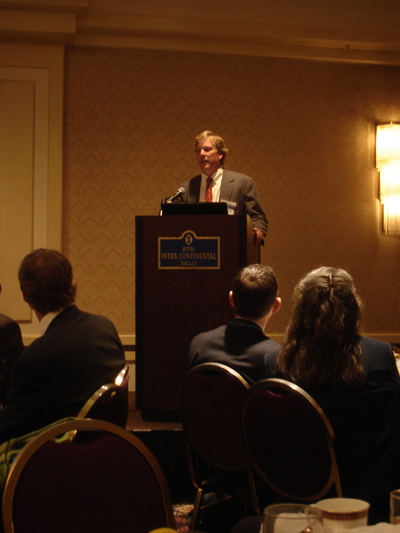
Tom Pickens says “You’ve got 24 months to get a seat at the table”.
Photo: copyright Dale Amon, All Rights Reserved
Now I could go on about all of the marvelous speakers and news events of the conference, or talk about all of the meetings I ran or attended… but instead I will show some of the fun side of the first few days of the conference.
While I was chatting with some old friends, someone commented that our Executive Committee Chairman, Gary Barnhard, bears a striking resemblance to Dr. Gerard O’Neill, the inventor of the L5 Space Colony concept, who died around 15 years ago.
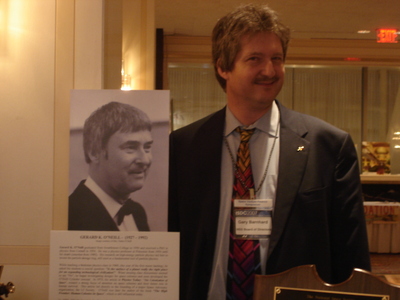
Gary Barnhard attempts to channel Dr. O’Neill.
Photo: copyright Dale Amon, All Rights Reserved
Armadillo Aerospace brought ‘Pixel’, one of the Moon Lander Prize contenders, to the exhibit room. It was quite a center piece of a reception for rocket scientists and activists. It reminds you why you are here, even after quite a few bottles.
It is amazing how difficult it is to talk, hold your bottle and enjoy the nacho dip at the same time.
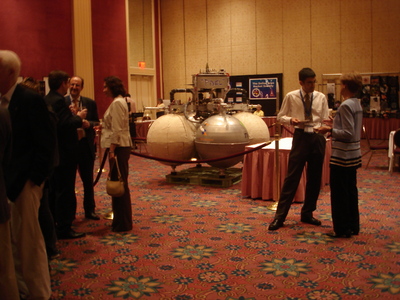
No we did not tap the fuel tanks when the cash bar closed.
Photo: copyright Dale Amon, All Rights Reserved
Glenn Reynolds. Rand Simberg and I have known each other for over 20 years so of course we had to get together to discuss blogging and how to fix everything. We were also joined for awhile by Alan Boyle of MSNBC.
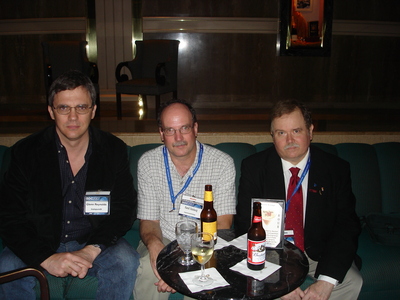
What do you mean, “we drank it all?”
Photo: copyright Dale Amon, All Rights Reserved
I was surprised to see a native Texas gal I’d not seen in a few years. Turned out Kaz had been in London while with the USAF.
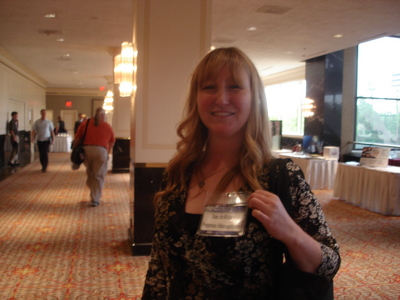
The world of rocket scientists has been improving steadily,
Photo: copyright Dale Amon, All Rights Reserved
I caught Glenn Reynolds in mid post just before the Space Blogger summit at the conference.
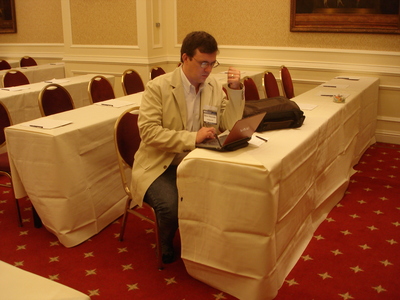
The blogfather at work plotting world domination,
Photo: copyright Dale Amon, All Rights Reserved
This brings me up to May 26th. I will try to post on the rest of ISDC 2007 tomorrow. If you can not wait, you will find hundreds of photos of the event in the archives.
|
Who Are We? The Samizdata people are a bunch of sinister and heavily armed globalist illuminati who seek to infect the entire world with the values of personal liberty and several property. Amongst our many crimes is a sense of humour and the intermittent use of British spelling.
We are also a varied group made up of social individualists, classical liberals, whigs, libertarians, extropians, futurists, ‘Porcupines’, Karl Popper fetishists, recovering neo-conservatives, crazed Ayn Rand worshipers, over-caffeinated Virginia Postrel devotees, witty Frédéric Bastiat wannabes, cypherpunks, minarchists, kritarchists and wild-eyed anarcho-capitalists from Britain, North America, Australia and Europe.
|
























